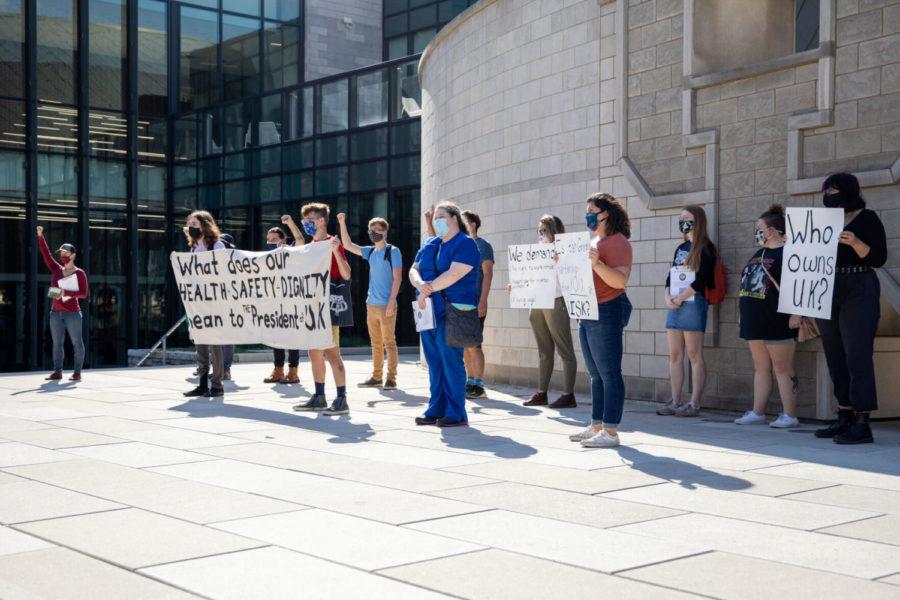Campus union continues petitions for Capilouto meeting, COVID-19 safety measures
October 22, 2020
Those exiting the student center Thursday afternoon may have noticed a dozen or so people holding banners, handing out flyers and asking them to sign a petition. For students, this is a frequent sight. But this time, their message had nothing to do with the moon landing or getting Kanye West on the ballot—it concerned the health and safety of campus workers during COVID, and it was aimed specifically at UK President Eli Capilouto.
United Campus Workers (UCW) Kentucky is a fairly young union, but its members have already made noise on campus. This summer, they put pressure on administration to take pay cuts and to extend free student testing to faculty and staff, two steps Capilouto ultimately took.
Now, they are calling for administration to meet with them. UCW has been trying to get a sit-down with Capilouto since May with no success, said sociology graduate worker Julia Miller.
In early summer, UCW had several productive meetings with other members of the UK administration, Miller said. But by late summer, after the union “saw some movement” on their goals, it seemed like UK had put up a wall.
“Something changed in the attitude of administration towards our movement,” Miller said.
In late summer, UCW had two administration meetings scheduled, one with the dean of internationalization concerning international student issues and the other with the dean of the graduate school concerning healthcare of graduate students and workers.
Both were cancelled via last-minute emails the days the meetings were supposed to occur, Miller said. The only reason UCW was given for these cancellations was that they were at the provost’s suggestion, Miller said.
Keegan Stewart, an ICU staff nurse for UK Healthcare, said that the message UCW wanted to send Thursday was simple.
“Just meet with us,” she said. “That’s it.”
Stewart said that she is involved in UCW not only for herself, but for her coworkers.
“Right now, none of us get hazard pay. And yet, we’re exposing ourselves every day to COVID, to many things,” Stewart said. “The list of things we’re exposing ourselves to is longer than the list of things that are being fixed.”
According to their latest petition, UCW Kentucky is asking UK administration to take the following steps:
- Offer free, continuous COVID-19 testing to all students, faculty and workers.
- Be completely transparent with the campus community (including parents, students and workers) around infections, COVID-19-related deaths, and contact tracing at UK.
- Offer all staff and faculty whose work allows it the choice to be remote to lower the density of staff on campus and the likelihood of an outbreak.
- Cover all healthcare costs associated with COVID-19 for campus workers.
- Offer all campus workers affordable, comprehensive healthcare during and beyond the pandemic.
- Offer Hazard Pay to in-person workers.
- Meet with United Campus Workers of Kentucky to discuss implementing these changes.
At least 700 people have signed the petition so far, Miller said.
Taylor Armstrong, a UK graduate student, said that she is grateful for the voice UCW has given her, especially concerning the financial difficulties for graduate student workers, now exacerbated by COVID.
“We’ve been so excluded from so many talks about our own lives as a graduate student, it’s been difficult to balance being able to live on a funded salary,” Armstrong said. “What can we live off of in this day and age, and who gets to decide that? And I think the people working who are actually living in these conditions living off of the salary should be able to get to have a voice in that.”
Thursday afternoon, some UCW members held banners that said, “Who owns UK?” and “What does out health and safety and dignity mean to the president of UK?” while others wrote on the Gatton Student Center walkway with chalk.
Aidan O’Brien, president of UK College Democrats, wrote one of UCW’s demands, “A living wage for all campus workers” in chalk. As an undergraduate student, O’Brien isn’t an official union member, but he said he thinks it’s still important to show support.
“I would encourage undergrads to get on board and support this because I mean we make up a huge chunk of campus, and we are the ones who have a lot of power,” O’Brien said. “If undergrads make their voices heard in this, we are more likely to get our goals accomplished.”































































































































































